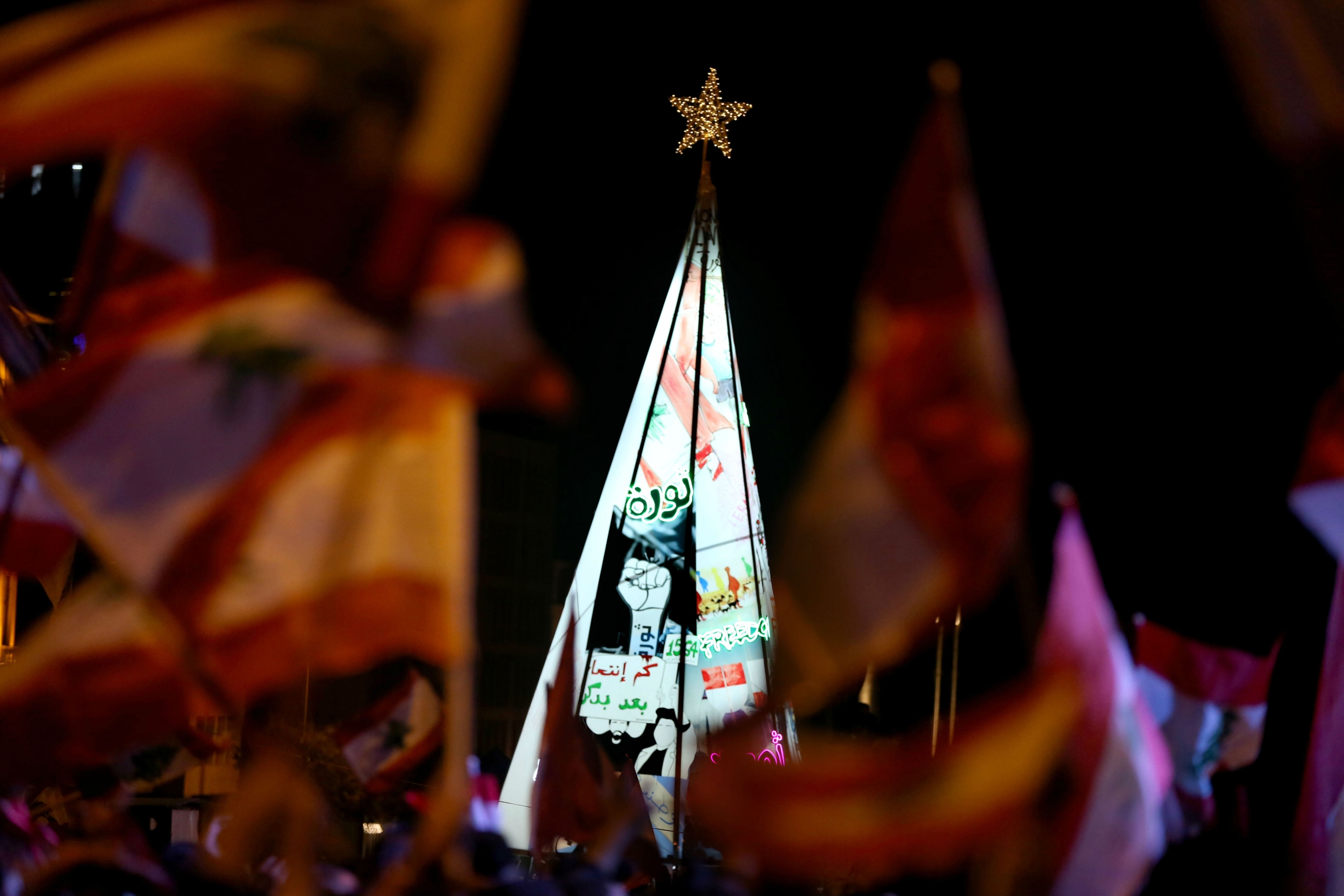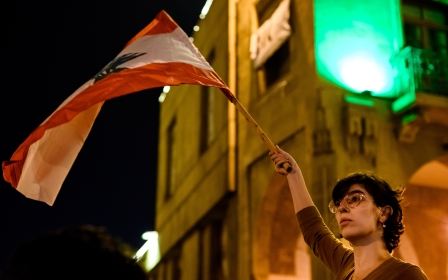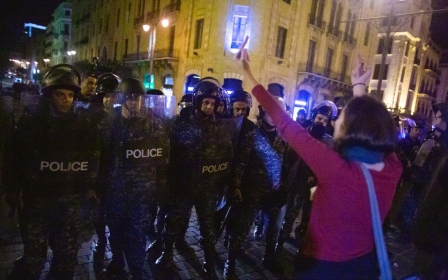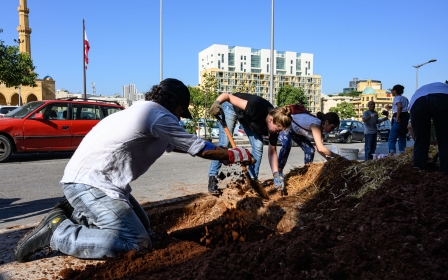Manousheh for Christmas: Charity initiatives launched to help struggling Lebanese

Lebanon’s deftly crafted veneer of prosperity is peeling off.
In glitzy downtown Beirut, graffiti on the wall of a shiny high-rise reads "We will burn your palaces" and “Give back the stolen money”.
Over the past two months, hundreds of thousands of Lebanese have taken to the street to demand the overhaul of a political and economic system they say has profited off the backs of the country’s marginalised citizens.
Poverty has already driven at least three men crippled by debt and unemployment to kill themselves since the country-wide protest movement began.
Flatbread for the poor
New MEE newsletter: Jerusalem Dispatch
Sign up to get the latest insights and analysis on Israel-Palestine, alongside Turkey Unpacked and other MEE newsletters
As Lebanon drifts further into its worst economic crisis in three decades, solidarity initiatives are mushrooming to thwart its direst effects and practice the cross-sectarian unity the popular uprising has been calling for.
“Manousheh 4 Lebanon” is one among many initiatives born out of people's desire to help.
“On the news we heard people saying they could not even afford to buy manousheh,” Pascale Comaty said, referring to the Lebanese flatbreads brushed with oil and thyme that are often sold for less than a US dollar.
Comaty, who has lived abroad for the past 12 years, contacted Cynthia Aramouni, a friend and founder of Beirut-based NGO “4 a Cause”, to offer help. Their initiative “Manousheh 4 Lebanon” blossomed, and incoming funds were shared with selected local organisations delivering food parcels across Lebanon.
By 2018 World Bank estimates, about a third of Lebanese people live in poverty, up from 27.4 percent in 2011-2012. More than 200,000 Lebanese have fallen into poverty since the war started in neighbouring Syria in 2011.
The institution warned in November that poverty could rise further to 50 percent if the economic situation worsens. Given that declining confidence in the Lebanese economy is causing higher dollarisation of deposits - which in turn takes a heavy toll on the balance sheets of banks and Lebanon’s central bank - a deepening economic downturn seems unavoidable.
Many say the impact of a crumbling Lebanese economy comes with a silver lining.
“More and more people are realising we’re not different, we’re all asking for the same things,” Comaty told Middle East Eye. “It took us 30 years to [unite], but I believe it’s only going to get better.”
Serge El Khazen, the owner of quick-service restaurant Boutata, also said he has “never seen people helping each other as much as they are now”.
When the uprising began on 17 October, El Khazen, who moved back to Lebanon five years ago, was contacted by Lebanese friends abroad wishing to pay for sandwiches to be delivered to protesters across the country.
As the needs grew, El Khazen found himself delivering food to families out of his own pocket, despite cash flows having dried up. The shutters will come down on his business at the end of December, he said, but insists he will keep feeding around 20 families who are dependent on him for as long as he can afford to.
“We are doing what the government should be doing for the poor,” he told MEE.
According to the Syndicate of Owners of Restaurants, 265 businesses closed down between October and November due to the worsening economic situation. The union predicted 200 more would follow suit in December.
No official measures have so far been taken by the caretaker government to address the spiralling economic crisis.
'We are doing what the government should be doing for the poor'
- Serge El Khazen, restaurant owner
As the protest movement gathered steam, then-prime minister Saad Hariri - who resigned on 29 October - put forward a reform package devoting 20 billion Lebanese pounds (then about $13.27m) to fighting poverty and announced a $100m loan from the World Bank targeting the most vulnerable families.
But the terms of the loan had yet to be finalised and the pledge failed to assuage a disillusioned Lebanese population.
The economic crisis now threatens to paralyse the health sector and leave many without life-saving surgery and urgent medical care. A Human Rights Watch report published this month found that the heathcare crisis stemmed from the government’s failure to reimburse private and public hospitals, making it difficult to pay staff and purchase medical supplies.
A shortage of dollars, which began in July but was exacerbated in November, is also preventing medical supply importers from bringing medical equipment into the country.
Additionally, the unofficial devaluation of the Lebanese pound, coupled with growing unemployment rates, is forcing more households to prioritise food and shelter over health.
'Everyone willing to help'
Christina Nakhle, a Lebanese expat living in Switzerland, has grown increasingly concerned with getting medicines to those who can no longer afford to pay for them.
Together with Dana Naja in the UAE and Nour Najem in Lebanon, she kick-started “Lebanon Needs” and launched a fundraiser to build first-aid tents and mobile pharmacies across the country.
When abroad “you feel you are far away and helpless”, Nakhle told MEE. “[The initiative] gives expats a way of contributing.”
All initiatives insisted on establishing a system of operating transparently, where the details of the expenditures and their beneficiaries are readily available to donors.
“What we really think is coming out of this revolution is that everyone is willing to help, but also that everyone is fed up with this ‘under the table’ way of doing things,” Nakhle said.
“We want transparency and we have nothing to hide.”
Middle East Eye delivers independent and unrivalled coverage and analysis of the Middle East, North Africa and beyond. To learn more about republishing this content and the associated fees, please fill out this form. More about MEE can be found here.





